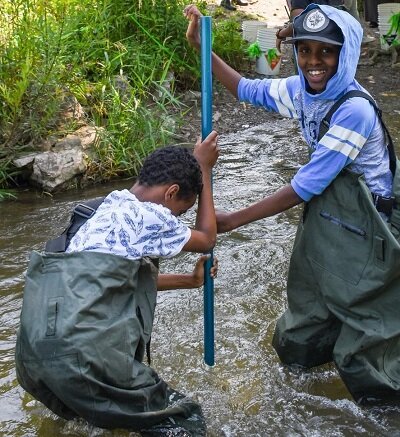EcoSpark Blog
Those aren’t just warts - They’re Hackberry Psyllids!
These warts, called galls, actually house a big secret. More of a little secret, really. Meet the Hackberry Psyllid.
Exploring the Hidden Benefits: Mental Well-being and Citizen Science Participation
Recent research unveils a remarkable truth: engaging in citizen science projects doesn't just contribute to our understanding of the natural world, it also holds profound benefits for our mental well-being.
Have You Heard of Bioacoustics?
Bioacoustics is the study of the production, transmission, and reception of sounds produced by or affecting living organisms. But why is it necessary?
SPRINGO and City Nature Challenge
Help put Toronto and the GTA on the map to win the title of the wildest city in Canada by taking part in the City Nature Challenge 2023 from April 28 - May 1!
The Wonders of Algae
Algae are some of the most impactful organisms on the planet. They are critical members of aquatic ecosystems, they’re important sources of oxygen, but they can also cause great destruction as a result of human pollution.
The Great Backyard Bird Count is Here
The Great Backyard Bird Count is a citizen science project where people worldwide watch birds over a four-day period (February 17-20) and report what they see to create an annual snapshot of the distribution and abundance of birds.
Caterpillars Count: Invasive Spongy Moths in Southern Ontario
Invasive Spongy Moth caterpillars are a common species found during EcoSpark’s Caterpillars Count surveys. In this blog post you will learn more about this species, its population control, and what can be done to slow its spread.
EcoSpark’s Changing Currents Program is the perfect experience for students to go green
Water quality monitoring through Changing Currents goes beyond being an outdoor experience that helps students explore the overall health of watersheds in their community.
What is Citizen Science and Why is it so Important?
Citizen Science is a participatory approach to environmental research where participants learn about local green spaces by contributing collected scientific data to real studies. Typically organized or managed by professional scientists, the collection of crowdsourced data sets are utilized to both gain a better understanding of the world around us, and answer practical and pressing questions.
It’s Spring! Celebrate with Citizen Science
This Spring EcoSpark is launching a new project called School Watch: Green Spaces as Learning Places. School Watch allows students to contribute meaningful citizen science data while learning about ecosystem health and positive actions in the community. To celebrate Spring, try the native plant activity (below) featured in School Watch!
Frogs and Toads
When thinking about the early signs of springs you might think about American robins, red-winged blackbirds, daffodils or crocuses - but let’s not forget about our amphibian friends.
A Primer on Invasive Alien Species and an introduction to Phragmites australis
Phragmites australis, also known as Phragmites or Common reed is a prolific invader of wetlands, and has been deemed one of the worst invaders by Agriculture and Agri-food Canada1. Keep reading to learn more about Phragmites and how EcoSpark can help you fight invasive species.
Get Started with Citizen Science with the Great Backyard Bird Count
Birds: They pollinate, eat mosquitos, spread seeds, poop fertilizer… oh yeah, and they’re dinosaurs. They are a fascinating way to get your feet wet in the wonderful world of citizen science. Read on to learn just some of the reasons why birds are awesome, and how you can help them!
Take Action: Remaining Engaged
Now that you have finished your stream study get active in your local schools and communities and try out some of these cool projects.
CoCoRaHS- A winter monitoring initiative for you and your students!
If you have not yet heard, EcoSpark is offering various curriculum-linked environmental projects for teachers and students through our School Watch Program where teachers and students can learn how to lead citizen science projects with their students on school grounds.
Action Research in Education: A look into Changing Currents
Action Research in education involves teachers identifying a question focused on their own teaching practice and then planning to take action with their students to help answer that question.
Phragmites Researcher Interview: Lynn Short
Lynn Short is a Professor and Researcher at Humber College in Horticulture. She is also the owner of a cottage in Tiny Township on Georgian Bay, where she developed an innovative technique to remove invasive Phragmites (common reed) without herbicides.
Sparking Science Interview: Student Volunteers
Student participants had a lot to say about the 2018 Sparking Science through Mentorship Conference! This EcoSpark blog is by two students who wanted to share their experiences.
What’s black and yellow and needs your help as a citizen scientist?
Kudos to you if you guessed bumble bees. It’s sad but it’s true that this genus of key pollinator is in danger due to human activities such as pesticide use, climate change, and habitat fragmentation.
Feet First: Students Plunge in Evaluating their Local Streams
I had just looked up from the bug cupped in the hands of one eager student when I saw something that immediately brought a smile to my face. Another young girl who, unlike most of the other students, was not wearing rubber boots had decided to join her classmates in the water despite having only running shoes.




















